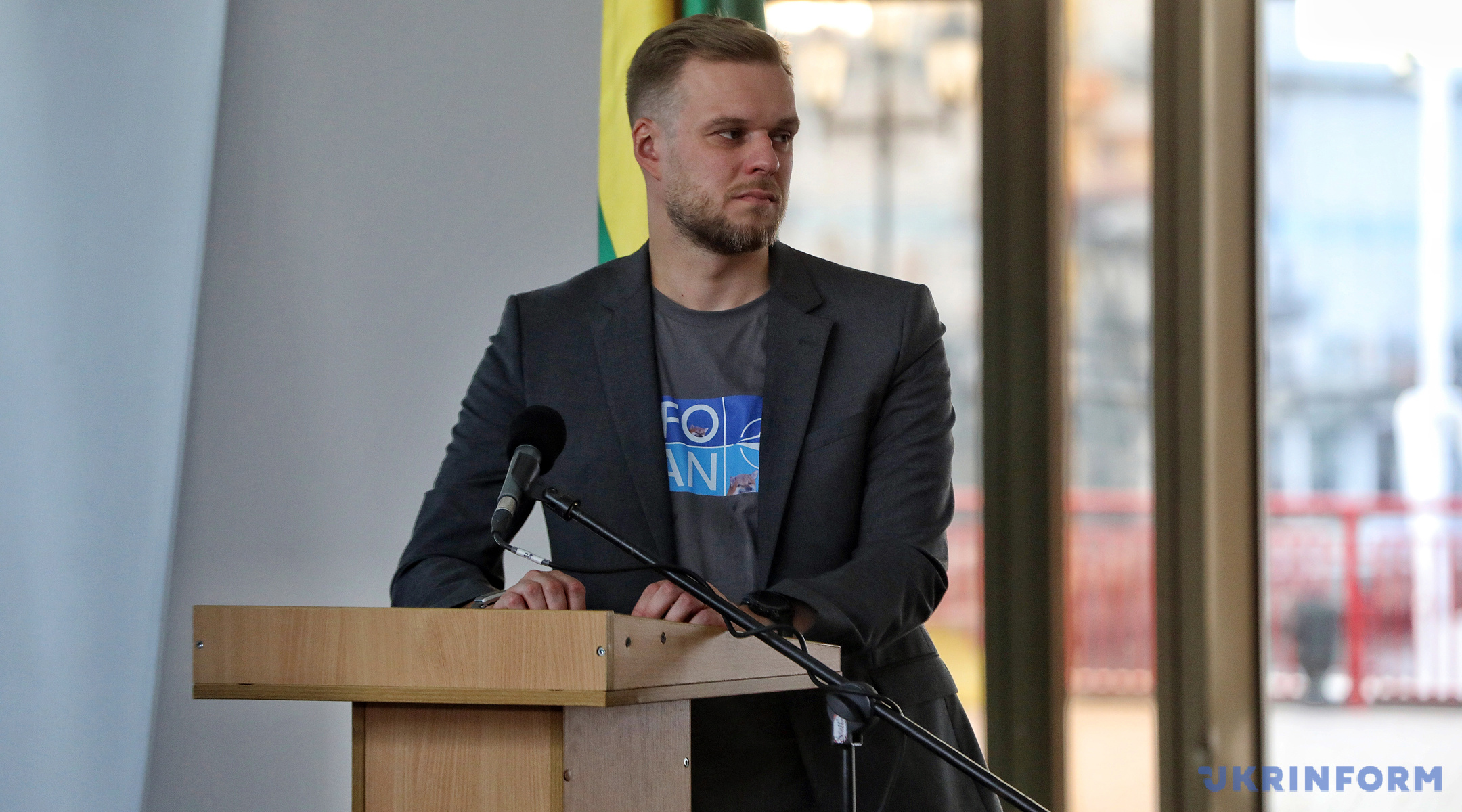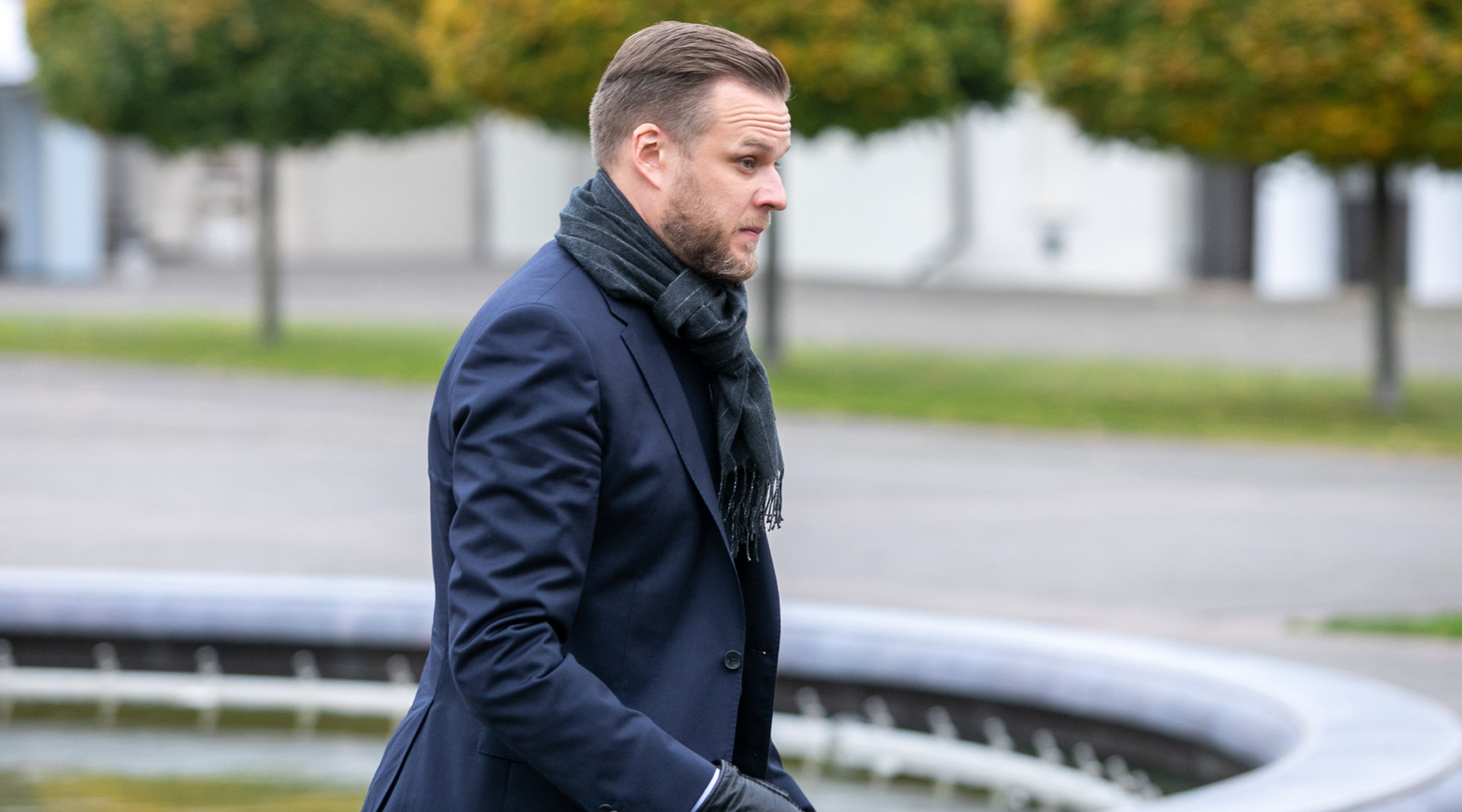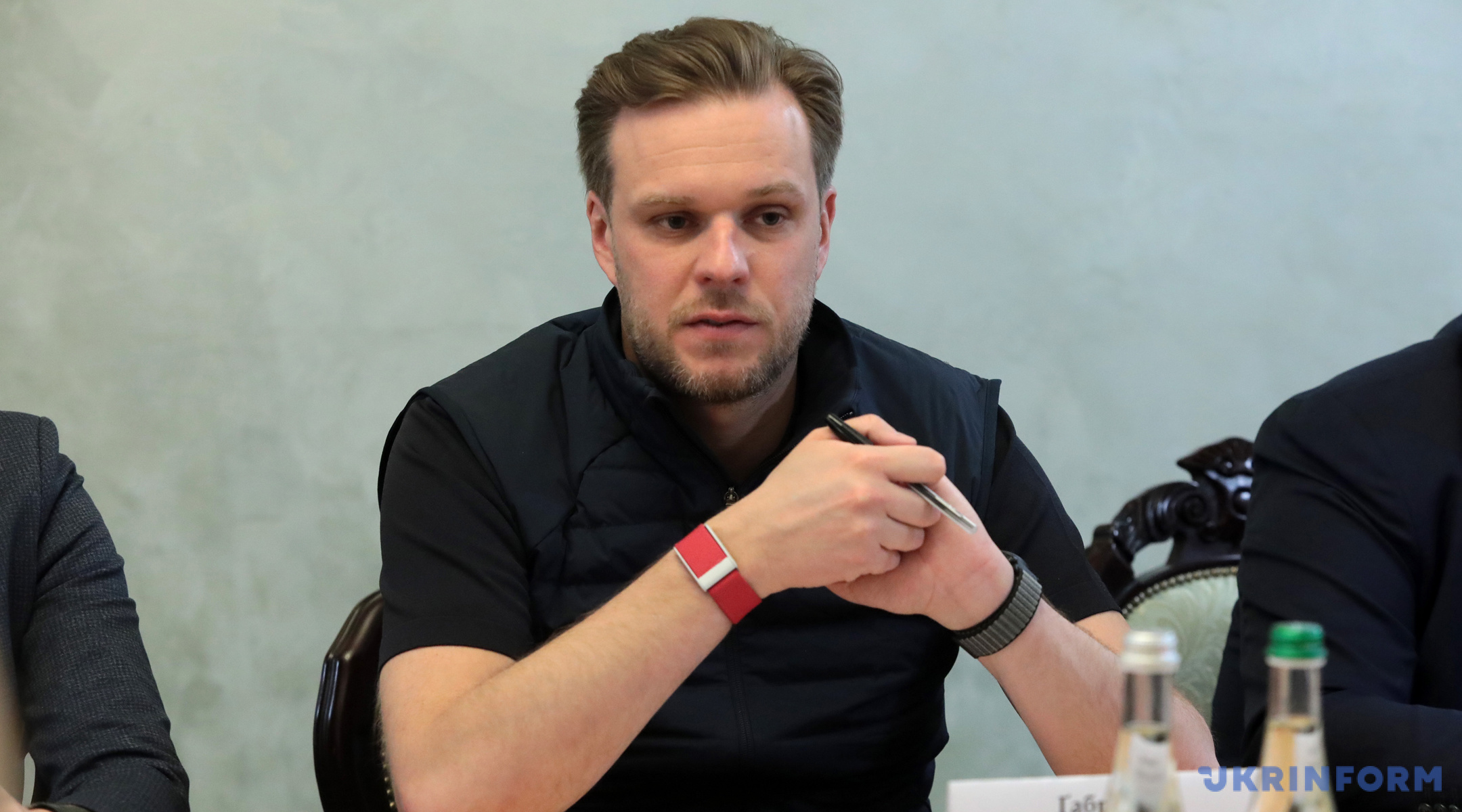Ukrainian Army has proved to the world that it skillfully employs NATO weaponry, destroying the invasion forces and liberating Russian-captured territories. Therefore, the allies have no arguments left to not provide Ukraine with an even wider range of weapons, which Lithuania has always advocated. Although the winter will be difficult for Europe, it will eventually free it from years of energy dependence on Russia. Ukrinform sat down with Lithuania’s Foreign Minister Gabrielus Landsbergis to talk about these issues, and much more.
UKRAINE’S PATH TO NATO INVOLVES CONVINCING THOSE WHO ARE STILL HESITANT
- Minister, thank you for being so supportive to Ukraine in our struggle against Russia. In this respect, Lithuania and you personally, as head of the Ministry of Foreign Affairs, strongly support us on our path to NATO. What, in your opinion, can be done and what new formats could be applied to speed up the process? And how do you assess the latest statement by President Volodymyr Zelensky seeking accelerated procedure for Ukraine?
- First of all, I’m not surprised that President Zelensky made the statement. I think that many have expected Ukrainian officials, politicians, leaders to say something like that. Ukrainian Army is already being armed as NATO army, is being trained as NATO army, so it only remains a question when it will actually become part of NATO and country becomes part of the Alliance.
So this question is in the room. It’s a big elephant that’s impossible not to notice. I think the first step is that the decision has to be political, it has to be made in political offices. So, the convincing needs to happen. We need to talk with our partners and try to convince everybody who’s not yet convinced that Ukraine’s future is in NATO but also NATO’s future is with Ukraine. I don’t see it any other way.
- Speaking of alliances, regional, local unions and initiatives are also important now. The Lublin Triangle, LitPolUkrBrig, The Three Seas, and others. What kind of work is to be done within these formats or maybe others to help Ukraine repel Russian aggression? I’m not saying, militarily but maybe in a consultation format or something else.
- Lithuania, due to our regional constellation, is a member of several formats as well, including Nordic-Baltic, Poland and Baltic, and then the Lublin Triangle… We’ve seen from our experience, when it comes to integration into EU or NATO, these formats are really helpful in speeding up the reforms. We share our experiences, are offered advice and experiences by others who went through the accession previously or were going through different experiences, so I think this is like a platform of helping each other out. So I think that Ukraine’s case would be similar – that the formats that you’ve mentioned would be those where you present the main issues that you’re struggling with or need assistance with when it comes to designing laws or reaching the necessary criteria for the EU or NATO accession because they also have the political track when it comes to rule of law and other things.
WE’RE STILL AT THE ESCALATORY STAGE SO WE HAVE TO BE PREPARED FOR MORE EVENTUALITIES
- Now as the war is ongoing here in Ukraine, of course it has impact on the entire European region and the whole world to a certain point. What challenges and threats did you country face in connection with the full-scale Russian offensive? What is the current security situation in Lithuania and the entire Baltic region?
- I think we’re part of a global community when it comes to energy prices, food prices, everything that is happening as part of Putin’s war in Ukraine – it’s also part of Putin’s war against the global community. So there are these issues that we are facing. It’s a challenge, but we’re still hoping we have enough European solidarity to overcome them. But obviously one of the biggest challenges is a geopolitical one.
For 30 years, Lithuania was one of those countries saying that Russia is a threat. That it’s an aggressive imperialistic power with no good intentions to its neighbors. We can say that we’ve been right. But these words do not make us safer. So we are very much keen on helping Ukraine win because it makes us more secure and also secures the whole region, but in the meantime we’re making sure that we can prevent any escalation to more countries so that’s why in Madrid, where NATO pledges support to Ukraine, it also pledged support to countries in the Baltics, in the eastern flank, that they will be defended as well. So I would say that this probably one of things that we’re looking into.
- Now that Sweden and Finland are in the final stretch to NATO membership, have your contacts with these two nations expanded? Do you feel more secure, knowing that these two countries are about to become part of the Alliance?
- It’s a very strong message. NATO is getting stronger. Through these decisions, the Baltic region is getting stronger. I’d definitely like to see Finland and Sweden becoming members faster because I think that staying in this “not yet” situation is not safer to anybody. So I would definitely like to see them in. But with what we’re seeing happening in the Baltic Sea itself - I’m talking about the recent sabotage on Nord Stream 1 and Nord Stream 2 – it makes you think whether the Baltic region is actually safer. I think that we’re still at the escalatory stage so we have to be prepared for more eventualities. And therefore, in order to compensate for them, we have to make sure that we invest in our safety as well, together with our allies here in the Baltic region. So I say that this is an important step but doesn’t yet solve all the issues we’re currently facing.
- Speaking about eventualities and the recent incidents at the pipelines, do you believe your country’s energy infrastructure may be targeted in some kind of hybrid attacks, not directly militarily but “no one knows who did that”? Are you considering this possibility?
- It definitely makes you think that there is an actor in the Baltic Sea with an intent and capacity to attack infrastructure. And there’s a lot of infrastructure in and around the Baltic Sea. So definitely I think it has to be thought through and at this stage all the countries are doing that mostly on their own, seeing what we can do in order to make our infrastructure more secure.
But I think it has to be approached through multinational formats, such as NATO. Because it’s a real issue. The sea itself is not really large. It means that any activity here affects everybody equally, even though it might have happened near Danish or Swedish territorial waters. But Lithuanian territorial waters are just a few hundred kilometers away. So it definitely affects all of our security. And it has to be seen as a common area for the need for increased security.

LITHUANIA IS HELPING THOSE STILL SEEKING THEIR WAYS TO GET OUT OF RUSSIA AND BELARUS
- Another sphere of security – information, the media space. We know that Lithuania has been among the champions of eradicating Russian propaganda. But what is the current situation of your information space? How did the arrival of Russian and Belarusian journalists influence it? To what extent has the influence of Kremlin propaganda remained in place?
- I would say that when it comes to Kremlin propaganda, we managed to make some necessary steps from the political standpoint. That means the decisions were made to limit TV channels, for example, that were actively promoting war in Ukraine and all that propaganda nonsense. So that was done. But also I’d say that people in our country have already evolved to a certain level of knowledge and understanding of how to deal with propaganda, when it’s on social media, how to be certain of what is true and what is not. We’ve been in this situation for a very long time. We’re not new in this game. So I’d say that there’s a level of certainty that we’re doing alright at this point.
The arrival of Russian and Belarusian opposition and journalists in Lithuania, I think, has only had a positive impact because many of them are professionals in their field. This means they are providing not just Lithuanians, but a much broader community, with objective information as much as it is possible to get that information from Russia or Belarus and to spread it though independent channels. So it is useful and it is helpful. We are keen on continuing cooperation with those who arrived, and helping both who are already here and also those still seeking their ways to actually get out from Russia or Belarus.

GLOBAL INITIATIVE IS NEEDED TO RESTORE UKRAINE, SUCH AS A NEW MARSHALL PLAN
- Of course, Lithuania also welcomed lots of Ukrainians who were fleeing the war, and we’re thankful for that. But we also heard that Lithuania is participating in infrastructure restoration in Ukraine. What are Lithuania's future plans in this regard?
- The bottom line is that we are still looking for what is called a European of global initiative. Because when we are talking about the restoration of Ukraine, it’s not news to you, but it’s a huge country. Compared to Lithuania, it’s an enormous country. So any country’s single effort in most cases is a show of good will. But if we’re keen on restoring schools, bridges, hospitals, the whole infrastructure that is still being destroyed as we speak, we still need a concerted effort. Like a Marshall Plan that was established in Europe after World War 2, so there has to be a Marshall Plan for Ukraine. So that’s the bottom line. But despite this fact, while we’re waiting, we will do our part to the best of our ability. We have a budget for next year that will be dedicated to it. It is actually being discussed now. The parliament will be presented the budget next week and it will have money allocated just for building certain objects. It could be schools, other social or cultural objects in Ukraine that we agree with the Ukrainian authorities that this is what’s needed and this is what we can do. We will start working on that, I’d say, next year.
THIS WINTER, EUROPE WILL PAY “DIVIDENDS” FOR DECADES OF BUILDING UP DEPENDENCE ON RUSSIA
- Speaking of costs, the winter is coming, and it will be really hard here in Ukraine as we’re aware of Russia’s plans to hit our energy infrastructure, our critical infrastructure, but we also understand that winter might be hard for many Europeans, too, due to Russia’s energy blackmail. How do you think Europe is prepared to live through this winter? Will it stand up to its current stance on Russia after the cold kicks in?
- I think that Europe now, as a Union, is prepared as much as it could get prepared in a short period of time. And yes, we’re paying a big price for that. But we’re also paying for decades of building on dependence on Russia. We overlooked what is called the national security margin in this and now we have to pay “dividends” for all the decades that we overlooked it. So this is what’s happening and nobody should be extremely surprised that it has to be done. The diversification from Russian energy sources is happening extremely fast. And I hope that the best-case scenario would be that we would just have to live through one winter. It is probably not going to be very cold but it would be expensive. But we have to keep in mind that if we keep the solidarity alive, that could be the last winter that’s so expensive. Secondly, we have to keep in mind that the Ukrainians currently will not have an expensive winter but, in many cases, a cold one. So we should not be complaining that much and rather show solidarity with those who are fighting for their sovereignty.
TO PUTIN’S NUCLEAR BLACKMAIL NATO MUST SHOW DETERMINATION THAT ITS RESPONSE WILL BE “CRIPPLING”
- Energy blackmail is not the only one Russia is putting forward. There’s definitely nuclear blackmail. It’s being looked into very seriously by Ukraine and its partners. There’s saber-rattling, but we still take it seriously. What should be the way of collective deterrence needed to stop Putin in his tracks if he actually looks into employing such deadly weapons?
- I think that the messages and the wording used by NATO and some of the allies within NATO is the right one. It’s first of all we cannot let Putin blackmail us – be it nuclear, be it Zaporizhia (Nuclear Power Plant - ed.), be it food or energy, the answer always has to be firm. And that’s incredibly important. I think that the exact phrase was that in case Putin decides to do something that proves he’s out of his mind, the answer would be “crippling.” And I think that we should stick to this. Not to necessarily go into more details – I don’t think that it’s needed – but to show resolve, that the answer would be crippling.

ALL OF OUR STOCKS NEED TO BE OPENED FOR THE UKRAINIAN ARMY
- Talking about conventional weapons… Given the latest gains of Ukrainian Army in the east and south somewhat changed the perception in the West of what Ukraine needs on the battlefield to successfully oust Russia from Ukraine? Is there any readiness to supply, perhaps, some other types of serious equipment? Say, main battle tanks, aircraft, more air defense systems, or new types of munitions for the already supplied platforms? Are you aware of any of such talks?
- Lithuania has always been advocating at all possible levels that Ukraine needs everything that we have, not giving any arguments like “we just give you Javelins and Stingers, and maybe something else.” It was clear that Ukrainian Army is able to, capable of using NATO-grade weaponry to successfully conquer back the occupied territories. Now we are at a point where the arguments that were used before are lost. Some of our allies would argue that “this is too technologically advanced to teach and train Ukrainian soldiers,” we even heard some arguments that it could be “lost” or “destroyed” or something like that. It is clear that all these arguments are no longer valid. If they are no longer valid, I don’t see a reason why Ukraine should not be provided with everything that we have. I’ve said it before, and I’ll repeat it now, that all of our stocks need to be opened for the Ukrainian Army.
If training is needed, now we have platforms for that as well. People are being trained in many countries. As I understand it was mentioned by Josep Borrell that every European country now participates (to a different degree but still participates) in training Ukrainian soldiers. So I don’t see any arguments. And if there are still debates ongoing, this is unfortunate because the longer the debate drags, the longer the war drags.
- I hope your counterparts in the EU and across the Atlantic will be as resolute as you are.
- We’re keen on providing political arguments for that. Unfortunately, we don’t have huge stocks of our own.
- To wrap this up, please convey our best wishes to the deeply respected Vytautas Landsbergis. We wish him good health. So here’s a personal question: what does the example set by such an outstanding grandfather mean to you?
- Well, when I started as a politician almost a decade ago I considered that the “historic” times are over. That Lithuania had its moment in history when we reclaimed our independence and now we’re at this post-historic stage. Now it’s clear that I was wrong. Everybody was wrong. History is continuing, and Lithuanian history is continuing as well. But that raises the level of responsibility for everyone who’s participating now. So there are many people, not just me, who would try to think deeper as to what kind of decisions, what kind of stance people like my grandfather, and others, had to take in the 1990s. How did they present themselves? How did they see Lithuania? How did they see their responsibility and Lithuania’s responsibility in the 1990s? And probably we need to learn from them and apply the lessons of theirs to these times, to make sure we’re doing the right thing in these truly historic times.
Ievgen Matiushenko
Photo credit: Nina Liashonok and 15min.lt
